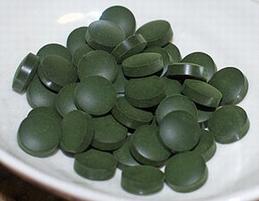 A study reported in Nutrition Reports International in 1988 suggests that taking spirulina as a dietary supplement can help lower serum levels of cholesterol, which is linked to increased risk for heart disease among other things.
A study reported in Nutrition Reports International in 1988 suggests that taking spirulina as a dietary supplement can help lower serum levels of cholesterol, which is linked to increased risk for heart disease among other things.The study involved 30 healthy male volunteers who had mild hyperlipidemia or mild hypertension with half receiving 4.2 grams of spirulina per day for 8 weeks and half receiving the same dose of spirulina for 4 weeks only.
Spirulina use significantly reduced the total serum cholesterol and discontinued dietary supplementation led the serum cholesterol back to the baseline.
The reduction in the serum cholesterol was more significant among individuals with hypercholesterolemia and those who had high intake of cholesterol. The Spirulina dietary supplement did not affect highdensity lipoprotein cholesterol while a tendency to slightly increase was observed. Spirulina did not change serum concentrations of triglycerides and body weight. And no adverse effects were observed associated with taking spirulina.
Spirulina is readily available over the Internet in the form of powder and it provides more benefits than lowering cholesterol.





